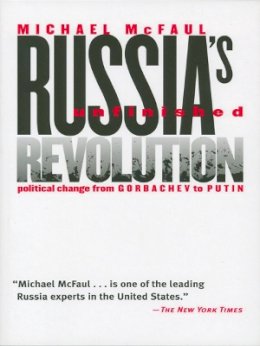
Russia's Unfinished Revolution: Political Change from Gorbachev to Putin
Michael McFaul
For centuries, dictators ruled Russia. Tsars and Communist Party chiefs were in charge for so long some analysts claimed Russians had a cultural predisposition for authoritarian leaders. Yet, as a result of reforms initiated by Mikhail Gorbachev, new political institutions have emerged that now require election of political leaders and rule by constitutional procedures. Michael McFaul traces Russia's tumultuous political history from Gorbachev's rise to power in 1985 through the 1999 resignation of Boris Yeltsin in favor of Vladimir Putin.
McFaul divides his account of the post-Soviet country into three periods: the Gorbachev era (1985-1991), the First Russian Republic (1991-1993), and the Second Russian Republic (1993-present). The first two were, he believes, failures—failed institutional emergence or failed transitions to democracy. By contrast, new democratic institutions did emerge in the third era, though not the institutions of a liberal democracy. McFaul contends that any explanation for Russia's successes in shifting to democracy must also account for its failures. The Russian/Soviet case, he says, reveals the importance of forging social pacts; the efforts of Russian elites to form alliances failed, leading to two violent confrontations and a protracted transition from communism to democracy.
McFaul spent a great deal of time in Moscow in the 1990s and witnessed firsthand many of the events he describes. This experience, combined with frequent visits since and unparalleled access to senior Russian policymakers and politicians, has resulted in an astonishingly well-informed account. Russia's Unfinished Revolution is a comprehensive history of Russia during this crucial period.
Product Details
About Michael McFaul
Reviews for Russia's Unfinished Revolution: Political Change from Gorbachev to Putin
Journal of Peace Research
McFaul gives an erudite and well-documented history of the last fifteen years, from Gorbachev to Putin.... He brings striking firsthand experience to bear: The access he managed to obtain, and the time he spent with the revolution's various political players, brings fresh material and keen insight to the story.
Washington Monthly
McFaul has done an immense amount of research, and his narrative is dense and solidly anchored in a detailed bibliography.... This book carries the often discouraging tale of Russia's quest for democracy forward to the new century.
Library Journal
McFaul, in an elaborately researched volume, asks why the effort to create new and stable political institutions initially failed—first under Gorbachev and then during Boris Yeltsin's first term—only to succeed under the 'Second Russian Republic'... McFaul's book is especially noteworthy for its rich detail, greatly enhanced by interviews with almost all the key players.
Foreign Affairs
Michael McFaul's book on Russia's transition from communism is likely to prove one of the most lasting and authoritative studies in its field. Particularly valuable is the framework it offers for comprehending the changes that have occurred.... Quite apart from the value of the theoretical argument, however, the book is likely to become the authoritative study of the period for its sweep, balance, and clarity.
Journal of Democracy
The author is one of the most distinguished and engaged commentators on Russian politics.... He has produced a highly sophisticated, balanced and informative analysis of the emergence of Russian democracy that leaves open the question of whether it will become a consolidated democracy.
International Affairs
